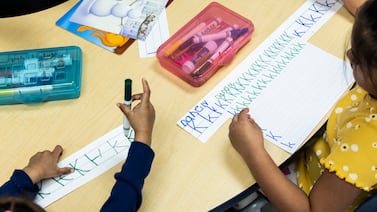Sign up for Chalkbeat New York’s free daily newsletter to keep up with NYC’s public schools.
As New York City schools stand to lose nearly $1 billion in the next fiscal year, City Council members pressed Education Department officials on how the looming drop in funding could impact the city’s early childhood system, school cafeteria menus, and other key education programs.
The Wednesday hearing came as City Council members and Mayor Eric Adams continue to negotiate the city’s budget for the next fiscal year, which is due by July 1.
Last month, Adams unveiled a budget proposal that would see the city’s Education Department funding shrink by 2.4%, or $808 million, next year — largely spurred by the expiration of billions of dollars of one-time federal COVID relief funds. Despite that drop in funding, the proposed budget devotes half a billion dollars in city and state funds to preserve several education programs currently propped up by the expiring federal dollars, including money for hundreds of social workers, the city’s free preschool program for 3-year-olds, and new staffers working in homeless shelters.
Other programs that have relied on the federal funds, however, remain at risk.
Education Department officials acknowledged the difficulties presented by the expiring federal funds, noting that they’ve advocated for the continuation of all such programs. Specific decisions about which programs to devote long-term city funding to have been made by the city’s Office of Management and Budget, said Emma Vadehra, the department’s chief operating officer.
Questions also centered on how the city’s schools would be impacted by sweeping cuts that Adams has ordered city agencies to enact over the past year to help cover costs for services to an influx of migrants. Under that separate directive, the Education Department faces more than $700 million in cuts to city funding for specific programs next year, including roughly $170 million slashed from early childhood programs. (The city’s overall contribution to the Education Department’s budget would still rise by nearly $1.6 billion under Adams’ proposal, though it’s not enough to offset the vast drop in federal funding next year.)
Schools Chancellor David Banks told council members it’s been “very challenging” to select certain programs to prioritize.
“I mean, it’s like, ‘Which one is your favorite child?’” he said. “These are all wonderfully, amazing programs. We don’t want to lose any of them.”
Here’s a look at some of the key education issues that arose during the hearing:
Council member clashes with DOE over preschool programs
Though Adams’ proposed budget would replace $92 million of expiring federal funding for 3-K — the city’s free preschool program for 3-year-olds — it does not restore a separate $170 million cut to city funding for early childhood programs. City Council members repeatedly expressed concerns over that cut during the hearing, seeking further details from Education Department officials about the potential impact of reduced funding.
Building up the free prekindergarten system for the city’s 3- and 4-year-olds was a centerpiece of former Mayor Bill de Blasio’s administration. Under Adams, the sector has been plagued with problems, including declining enrollment and lengthy payment delays to community organizations running programs.
On Wednesday, Education Department officials contended those issues had been inherited from the prior administration. They pointed to some improving metrics in the city’s early childhood system, stating enrollment in such programs had grown to roughly 114,000 children. That was up from 97,000 children earlier this year, according to city data released in November. Meanwhile, the average processing time for payments for early childhood providers had decreased to roughly 11 days.
Officials added they’ve worked to shift existing seats to neighborhoods with higher demand.
Capacity for the city’s 3-K program is roughly 53,000 seats, with about 44,000 filled, according to figures shared by Education Department officials during the hearing.
In one particularly contentious exchange, Brooklyn Council Member Lincoln Restler questioned why Education Department officials were unable to say definitively how many seats the city’s preschool programs would be able to offer next year after the $170 million cut.
“These are the cuts that the mayor has proposed that he wants to implement to your agency: What would be the impact of them?” he said. “How many fewer seats would you have? This is like the most plain, simple, obvious question that we were going to get all day. I’m a little disappointed that we’re not getting a straight answer.”
Education Department officials said any reductions would be focused in areas where seats aren’t filled.
Restler also pressed department officials for details about the full release of a report on 3-K seats. City officials hired the consulting firm Accenture last year to “map out needs and seats” as the program grappled with thousands of vacancies.
Officials previously said Accenture would be paid $760,000 to compile the report. But on Wednesday, Education Department officials cited a significantly lower figure of “$350,000 or $250,000.” They did not provide a precise timeline for the release.
City officials did not immediately explain the discrepancy between the two figures.
Budget cuts prompt concerns over school food
City Council members also expressed concerns over how budget cuts to school food would affect students next year. A $60 million November cut to the city’s school foods budget sparked outcry earlier this year, as the reduced funding forced cafeterias to remove popular items like chicken dumplings and bean and cheese burritos from their menus.
Though the city later restored some of those menu items, council members questioned whether the lingering cuts would impact cafeteria menus in the coming school year.
“We are monitoring this very closely,” Vadehra said. “We are very invested in making sure all of these food options stay on the menu for students next year.”
City officials express concerns over state funding
Education Department officials noted multiple times during the hearing that although state funding for the city’s schools increased for the coming fiscal year, the city is getting less than expected. A change to the formula determining how much money is sent to districts left New York City schools with $126 million less than anticipated.
Over the coming year, the state’s Education Department will partner with the Rockefeller Institute to conduct a longer term examination of that formula, in hopes of implementing further changes, Gov. Kathy Hochul announced last month.
“Our costs do continue to grow each year, which is why it’s important the state’s contribution — which is a lesser proportion of our budget now than it was 20 years ago — continues to increase,” Vadehra said.
City Education Department officials also told council members they had not yet received sufficient funding to fully implement a state law mandating smaller class sizes. But the department will continue to invest in hiring additional teachers and expanding classroom space to remain in compliance with the law, officials said.
An additional $180 million will go to school budgets, with around $135 million explicitly earmarked for compliance with the state class size law, Vadehra said. She estimated those funds would allow for hiring between 1,200 and 2,000 new teachers.
“Assuming those teachers can be found,” she added.
Education programs still at risk as fiscal cliff looms
City Council members drew attention to several education programs that have relied on expiring federal funds and are not included in the mayor’s proposed budget — including $65 million funding roughly 400 contracted school nurses, as well as millions of dollars to support restorative justice programs.
Education Department officials were unable to say during the hearing how many schools would be left without a nurse as that funding dries up later this year. Currently, every public school in the city has at least one nurse in the building.
Meanwhile, restorative justice programs, which aim to resolve conflict through peer mediation and other less punitive methods, are at risk of losing more than half of their current budget as the federal funds expire. Education Department officials said roughly $8 million of the $13.6 million committed to restorative justice programs this year comes from expiring federal dollars.
At the hearing, Banks encouraged council members to advocate for the funding to be restored.
“You all are still engaged in the process,” he said. “You can certainly, as you are engaged in this conversation and negotiations, push to make sure that [restorative justice] gets restored.”
In total, the city’s Education Department faces a gap of more than $200 million in expiring federal funds for education programming next year, officials said.
Alex Zimmerman contributed reporting.
Julian Shen-Berro is a reporter covering New York City. Contact him at jshen-berro@chalkbeat.org.




